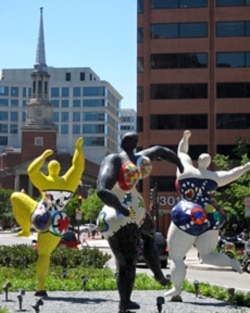Click Arrow to Hear This Program:
Or download MP3 (Right-click or option-click and save link)
DOUG JOHNSON:
Welcome to American Mosaic in VOA Special English.
(MUSIC)
I’m Doug Johnson.
Today on our show we play music by She & Him…
And take a look in Washington at some art on the street that is not street art.
But first we report on American efforts to get Hispanics to take part in the population count called the census.
(MUSIC)
Hispanics and the Census
DOUG JOHNSON: By law, the United States is required to count its population every ten years. In the last national census, or population count, Hispanics, or Latinos, made up twelve percent of the total population. Hispanic-Americans are the fastest growing group in the country. The census is taking place again. Officials say it is important that all Hispanics are counted. Barbara Klein has more.
BARBARA KLEIN: Many Hispanics are recent immigrants who work in factories or on farms. Many others work as day laborers. Many of them are living in the United States without legal immigration papers. But the census law says they still need to be counted.
Everyone living in the United States received census forms to fill out in March. They were supposed to mail back the form last month. Now, millions of census workers are visiting homes that did not return their census forms.
The census count is important because areas with higher populations will get more representation in Congress. Highly populated areas also get more money from the federal government. A Census Bureau official says four hundred billion dollars in grants and loans will be available over the next ten years. That money will be given out based on how many people live in different communities.
The census form asks ten questions, including the number of people living in each house, their ethnic group and race. Officials say that personal information will not be shared publicly. Still, the number of people in immigrant communities who respond to the census is low. Los Angeles, California is home to many Hispanics. Mayor Antonio Villaraigosa says immigrants are among the groups that need to be urged to provide the information.
Officials believe that language difficulties cause problems for many in the Hispanic community. In addition, more than ten million immigrants are thought to be in the United States illegally.
Most of them are Hispanic. These people often have false documents. Many live in fear of being caught and sent back to their home countries. But census officials are not permitted to ask about a person’s legal status or share information with immigration enforcement officials.
Officials in Los Angeles have launched a major media campaign aimed at Hispanics, including videos and digital networking. Actress Rosario Dawson starred in one of the videos. She says a correct census means more money for immigrant communities.
ROSARIO DAWSON: “I’m saying that this money, this opportunity that could be lost if it’s not used will not happen to you again for another ten years, ten years. So it’s really very important that you make your voices heard.”
A New Public Art Project for Washington
DOUG JOHNSON: The National Museum of Women in the Arts has brought some major color and sparkle to Washington, D.C.’s New York Avenue. The museum recently created an outdoor sculpture area in the center of the city. Four large, colorful statues by the French artist Niki de Saint Phalle are bringing art outdoors so people who live and work nearby can enjoy it every day.
In the future, other works by female artists will be shown as part of the museum’s “New York Avenue Sculpture Project”. Katherine Cole has more.
KATHERINE COLE:
“The Three Graces” is one of four sculptures newly on display on New York Avenue. It gives a good example of Niki de Saint Phalle’s playful art. The work is made up of three huge female forms that seem to be dancing.
They are covered in colorful pieces of broken glass tiles. One woman has black skin, another has white skin and the third has yellow skin. The work celebrates woman in her many forms.
Another work, “Nana on a Dolphin,” shows a curvy woman balancing on the back of a brightly colored dolphin. The woman’s body is covered with silver tiles which shine brightly in the sunlight. A sculpture called “#23 Basketball Player” is the artist’s energetic representation of Michael Jordan soaring into the air.
Niki de Saint Phalle was born in France, but spent much of her life in the United States. She died in two thousand two. Her large sculptures represent both the modern and the ancient. Many of them explore heroes, imaginary creatures, and the female body.
We asked several people visiting New York Avenue on Wednesday what they thought of the new art project. Will Thomas from San Diego, California praised the works.
WILL THOMAS: “I think they bring a little life to this street. I like them! I think that they are uniquely representative of the United States, of different cultures, our passions. And, I think they’re a nice addition.”
Jackie, who works nearby, has seen the statues at different times of day.
JACKIE: “I really like them! I like the colors, I like everything about them. And you know, they are really nice when they light up at night.”
One couple we talked to was visiting from France. They said they were very happy to turn the corner and see works by an artist they recognized from museums in their own country.
Nancy Harris from Washington also liked the artwork.
NANCY HARRIS: I think they are fabulous. They are colorful, and voluptuous and active. Like women!”
This is the first of four stages of the New York Avenue Sculpture Project. The project will last until two thousand fifteen and will show the work of several other female artists.
She & Him
DOUG JOHNSON: Zooey Deschanel is best known as an actress in small, independent films. But she is also making a name for herself as a singer and songwriter. She performs in the band She & Him with musician Matt Ward. They recently released a second album called “Volume Two.” Their dreamy songs sound like they came from another time period. Mario Ritter has more.
(MUSIC)
MARIO RITTER: That was the song “Home” from She & Him’s album “Volume Two.” Zooey Deschanel and Matt Ward make a good team. She writes and sings the songs and he plays guitar and produces them. They first worked together while making a song for the movie “The Go-Getter,” which starred Deschanel.
She had been writing songs for years. But she had never met a musician she felt fully shared her musical point of view until she met Matt Ward. Here is the song “Me and You.”
(MUSIC)
Deschanel and Ward have said that they chose the name “She & Him” because it was simple and did not call attention to itself. They named their albums “Volume One” and “Volume Two” for the same reason. They wanted the music to come first so that the songs would be what people remember most. We leave you with “Over it Over Again.”
(MUSIC)
DOUG JOHNSON: I'm Doug Johnson. Our program was written by Dana Demange and Jim Tedder with reporting by Mike O’Sullivan. Caty Weaver was the producer.
You can find transcripts, MP3s and podcasts of our shows at voaspecialenglish.com. You can also follow us on Facebook, Twitter and iTunes at VOA Learning English. If you have a question about American life, send an e-mail to mosaic@voanews.com. Or write to Special English, Voice of America, Washington, DC 20237, USA. Please remember to tell us your name and where you live.
Join us again next week for AMERICAN MOSAIC, VOA’s radio magazine in Special English.



